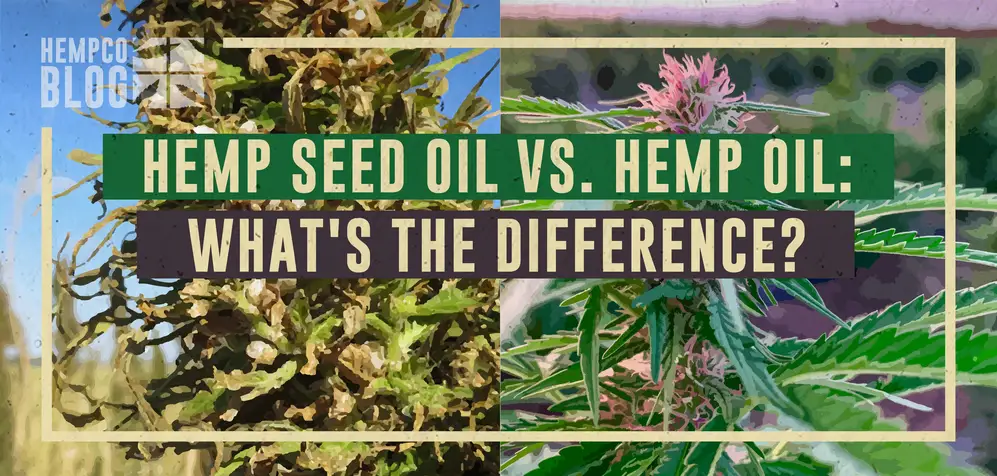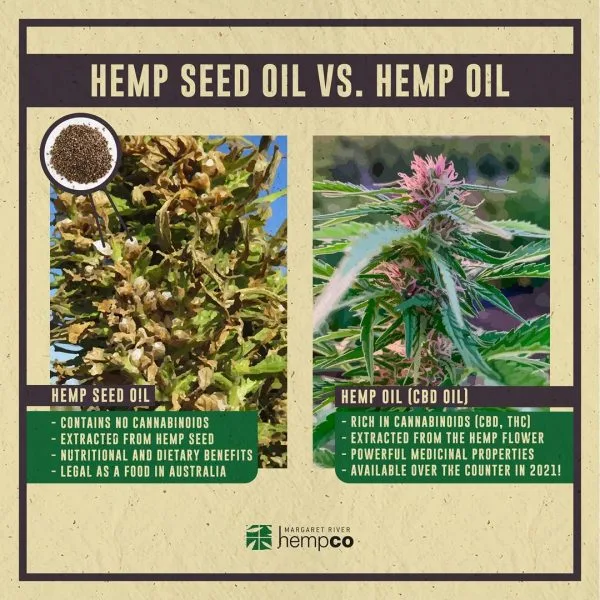
**Editors Note - This blog details the difference between Hemp Oil and Hemp Seed Oil, which has been revised for 2021.
This blog post has been re-written and reposted with more relevant and up to date information for 2020/2021. To see the original version of this post, please head over to this page!
Don't worry if you don’t; it’s easy to get them confused!
And to add to the confusion, the terms and labels used to identify them also vary from country to country.
Whether you know the difference or not, we’ve re-written one of our most popular articles with some clearer, more relevant information for 2021.
Due to the similar names, there's a common misunderstanding about how the two compare to one another. This misunderstanding is a regular one in Australia because people see hemp as a dietary supplement and marijuana as medicinal. Still, both come from the same plant: Cannabis Sativa.
Today we‘re going to distinguish the differences, and impart you with up-to-date knowledge and terminology so that you can make an educated purchase next time you're shopping for hemp products.
Hemp Seed Oil has been around for centuries, yet has never been confused with other byproducts of hemp. So why now?
The legalisation of Hemp and hemp-based products has brought about a whole new challenge in understanding. Those with little or no knowledge of the plant often mistake Hemp Seed Oil for Hemp Oil.
Hemp Seed Oil can be extracted from Hemp Seeds and produces a light to dark green oil with a nutty flavour and a variety of uses. This type of oil for food was legal in Australia as of 2017, since before the legalisation of other Hemp-based oils.
Hemp is grown for 70-90 days before you harvest if you’re farming for the stalk contents. However, if you’re farming for seed, you will have to wait an additional 4-8 weeks for the male Cannabis plant to pollinate the female plant. Only then will the plant produce Hemp seed.
After harvesting, you leave the plants out to dry, at which point machinery can process and separate the seed. A screw expeller machine presses the seeds to extract oil, which you then expose to centrifugal force to remove impurities. It can then be secured and sent for packaging.
Hemp Seeds are entirely free of any cannabinoids (CBD, CBG, CBN, THC etc.). Instead, they have a nutrient-rich profile that offers a plethora of benefits to you as a consumer.
How? Well, Hemp Seeds are loaded with Omega oils, protein, fibre, antioxidants and fatty acids that:
People could mean many things when they say Hemp Oil due to the general confusion among the masses about what it is. We’re here to clear that up.
Hemp Oil refers to what we call CBD oil, which is mainly extracted from the flowers of the female Hemp plant but can sometimes incorporate the leaves and stalk of the plant. CBD, short for Cannabidiol, is a cannabinoid that is extracted from the Cannabis plant using example, the supercritical Co2 extraction method.
Hemp Oil produces targeted medical actions for the body because it comes from a medical Cannabis species. What it has in common with the Hemp Seed Oil is the absence of THC, the Cannabis compound that produces psychoactive effects.
One might use Hemp Oil for:
It may also help in controlling symptoms of depression, anxiety and other anxiety-related disorders.
Hemp Oil became popular after the “green storm” took over the world a few years ago; one that doesn’t seem to be slowing down anytime soon.
The world recently discovered the therapeutic benefits of CBD and other Cannabinoids and has finally begun legalising them, leading to the sudden boom in CBD products in the markets.
The stigma that once surrounded the Cannabis plants and its products has somewhat died down, and people now want to learn how Cannabis can help them.
Even though we’ve laid out the difference between the two in the sections above, we needed to list them side by side so that you can differentiate between the two.
The Hemp Oil and Hemp Seed Oil differ in:
Hemp Oil has a medicinal nature and is used for medicinal purposes to treat several diseases. And although beneficial and therapeutic on its own, Hemp Seed Oil can’t claim medicinal status. It instead contributes towards your general health and wellness, assisting proper organ and body functioning.
Hemp Oil contains Cannabinoids (usually CBD) and other beneficial terpenes, essential oils and flavonoids that work synergistically to enhance the effects of CBD.
On the other hand, Hemp Seed Oil is rich in Omega 3 & 6, fatty acids, proteins, fibre and other nutrients, but does not contain any Cannabinoids.
Hemp Seed Oil is extracted from cold-pressed Hemp Seeds and does not contain any plant matter - as the name indicates.
People make Hemp Oil by extracting the oil from a female Cannabis flower; however, it can sometimes come from other plant matter (leaves and stalk).
You can extract Hemp Seed Oil using a cold-pressing method that involves a screw expeller pressing the seeds to extract the oil and a centrifuge machine refining the oil before packaging.
On the other hand, you get Hemp Oil by separating CBD from the Cannabis plant through the Co2 extraction method. The compound is then infused with a base oil before it is ready to use.
You can purchase Hemp Oil (or CBD Oil) from specialised stores with a proper license to sell CBD. In contrast, Hemp Seed Oil, being completely legal in Australia, can easily be purchased over-the-counter at any pharmacy in the country.

Misinformation about the Hemp industry is spreading as fast as the word about the Hemp products’ benefits. Thus, you must understand the difference between different Hemp products before making a purchase decision.
Hemp Oil and Hemp Seed Oil differ in their composition, source, extraction method, availability and their usage, although they are usually confused as the same product.
Thus, our general advice of always buying from a well-reputed company and carefully reading the product packaging before any purchase seems to be applicable here as well.
Buying from a trusted company that third-party tests its products not only saves you money and fatigue in the long run but also ensures product quality and your safety.
As self-proclaimed Hemp connoisseurs, we’ve taken it upon ourselves to educate our audience about all-things-Hemp to put an end to the misconceptions about the industry. We’re on a mission to help people and nature - through nature.